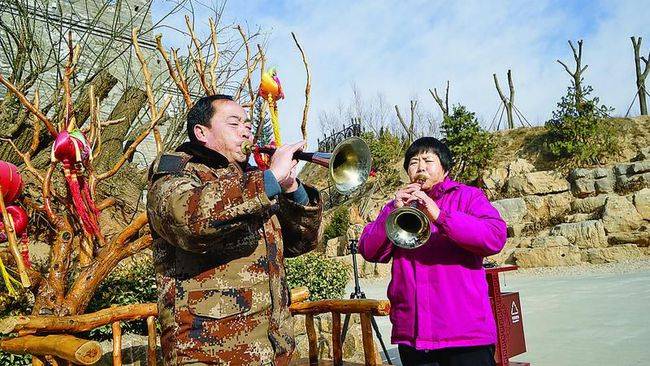Suona couples who want to inherit suona
"When doing a happy event, the tune should sound lively and festive, with the word 'le' from the beginning to the end; when doing a white event, it should be very sad, like crying, the rhythm is heavy and slow, and what kind of tune is played on what occasion "Recently, in front of the ancient building of "Jingfu Gate" in the old city of Huanzhou, Huang Fengbo and Gou Maiqin, who are playing suona, are particularly eye-catching.
Huang Fengbo is a standard post-60s generation. He has been weathered, his face is covered with the marks of the years, his body is slightly hunched, and his walking is a little slow. Huang Fengbo has been playing in Shiliba Village of Bazhu Township for nearly 30 years.
As a child, Huang Fengbo would be attracted by the sound of suona every time he followed his family to attend weddings and weddings. At the age of 14, Huang Fengbo, who dropped out of school at home, was introduced by his family to learn suona from Zheng Shixian, the master of Gu Shi. "Because the family was poor and had no other livelihood, I learned this craft." Huang Fengbo recalled that there was a heavy snowfall in one year, and he followed his master to take care of three things in a row, because walking 50 kilometers, he kept his feet and mouthed. Constantly, his hands and feet were frostbitten, and his cheeks were red and swollen. "Why do you suffer from this crime, you only earn 2 yuan a day." The stubborn Huang Fengbo gave up his suona-playing business.

In 1996, Huang Fengbo got married. The suona master who came to take care of his affairs came by car, with a net income of 10 yuan per day, which made Huang Fengbo excited again. In addition, my brother-in-law also wanted to learn suona, so together, Huang Fengbo found the suona lying in the corner for many years.
In 2015, Huanxian held a rural traditional artist talent competition, and Huang Fengbo signed up to participate. It was also in this competition that Huang Fengbo saw the gap between himself and his peers, and he began to study how to improve his skills. So he asked his peers and self-study on his mobile phone. After a period of time, his suona skills were greatly improved compared to before, and more and more people around him asked him to take care of things.
His wife, Gou Maiqin, has been fond of suona since she was a child, and the traditional concept of "women can't touch suona" discourages her. It was not until after living with Huang Fengbo that Gou Maiqin discovered through the Internet that there were many female suona artists, and she began to learn suona from her husband in 2016.
It may be because of long-term exposure, but Gou Maiqin learned faster than the average person. After half a year, she followed her husband and took care of the people around her. "I still remember that the first thing I took care of was a red one. Many people were very curious and watched around me." Gou Maiqin said that he was really nervous at the time, and it was also an explosive publicity for himself.
Since then, the couple has been involved in weddings and weddings in a radius of hundreds of miles, and they have also undertaken weddings and weddings in other counties (districts). "Now that we pay 200 yuan a day for an event, our couple can earn 400 yuan a day, and the income is quite good." Huang Fengbo said that in their spare time, they also play suona through live webcasts to undertake some business.
"I'm 53 years old this year, and now I'm looking forward to letting more people understand and like suona. As long as someone wants to learn, we are willing to teach." Huang Fengbo and his wife hope that in the new year, they will be able to accept one or two apprentices. The things left by the ancestors must be remembered by future generations.
 渝公网安备 50010702504639号
渝公网安备 50010702504639号